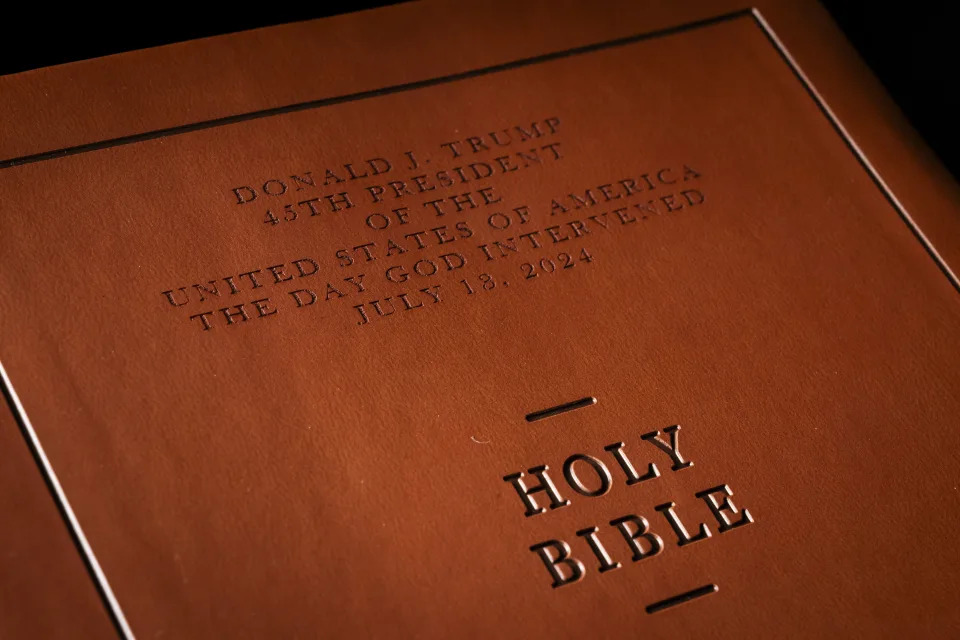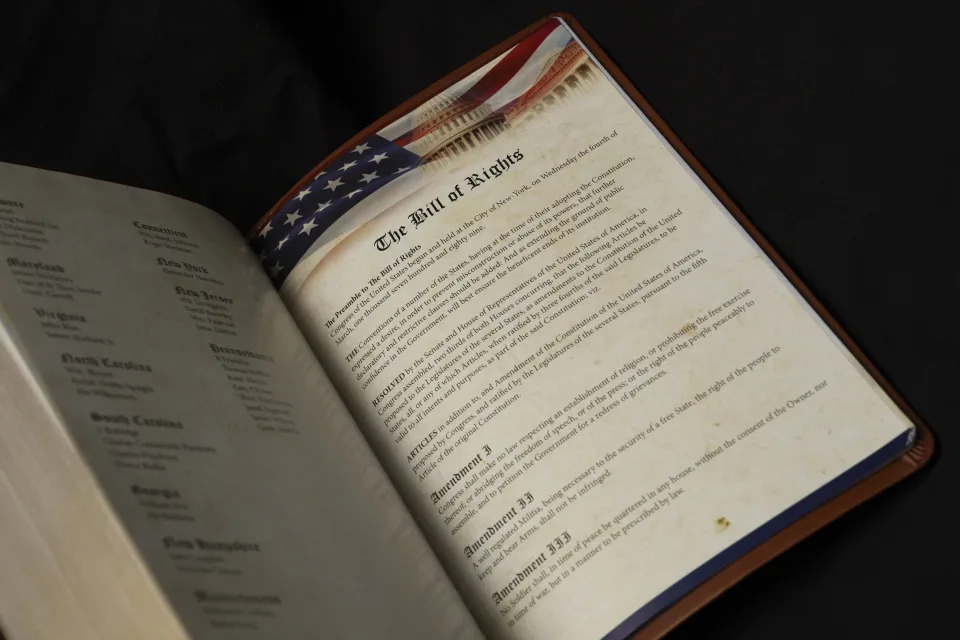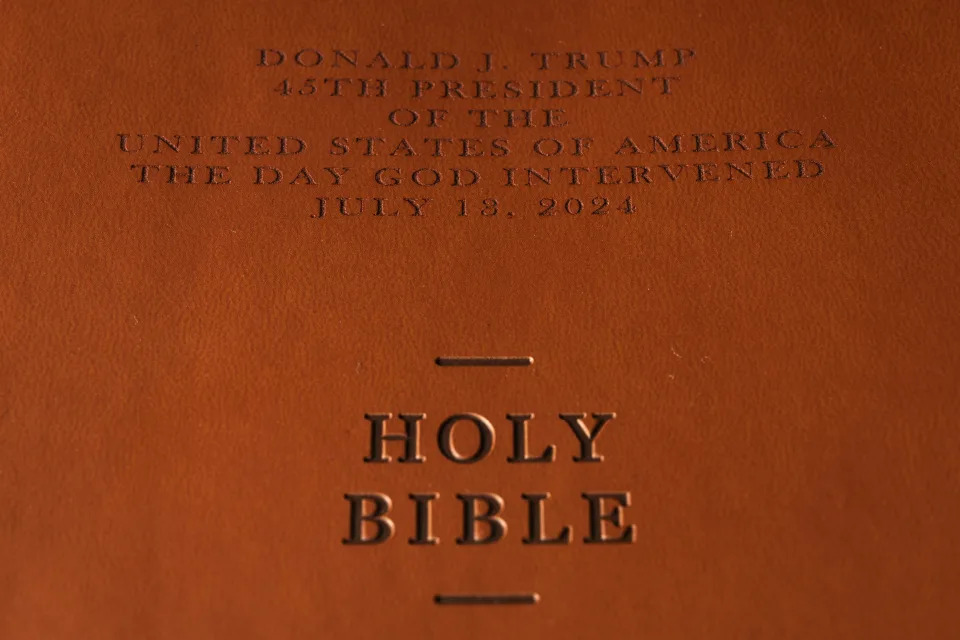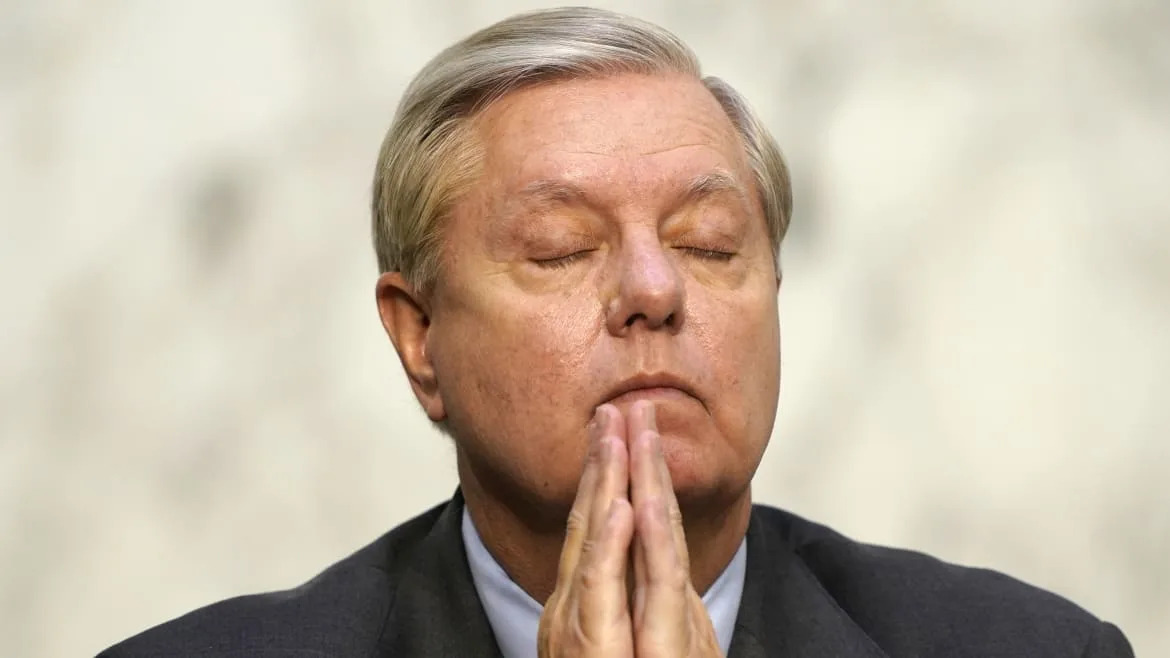If elected, Stein vowed to end the war in Gaza on day one.
Julia Mueller
Mon, October 7, 2024
The “Abandon Harris” group pushing for voters to protest Vice President Harris over the conflict in Gaza is endorsing the Green Party’s Jill Stein in the presidential race.
The group, formerly known as “Abandon Biden,” is calling on Muslim Americans and others frustrated with the Biden administration’s handling of the Israel-Hamas war to cast their ballots for the long-shot third-party bid.
“Our movement remains dedicated to ensuring that the American people, especially the Muslim-American community, recognize the responsibility we share in standing up against oppression and using all our power to stop genocide — wherever it may arise. On the precipice of the election, we endorse Jill Stein,” the group said in a release.
Stein, who also ran for the White House in 2012 and 2016, has little chance of being truly competitive this fall. She’s not on the ballot or lodging a write-in campaign in a dozen states, according to a tracker from her campaign, and a recent New York Times/Siena College survey of a handful of key battlegrounds had her polling at just 1 percent.
But her candidacy could act as a potential spoiler to Harris’s fast-tracked bid amid a tight race between the vice president and former President Trump, drawing votes in vital swing states where the two major party candidates are separated by a hair.
Democrats have long been frustrated by the Green Party, and Stein was seen as something of a spoiler to former Secretary of State Hillary Clinton’s 2016 campaign against Trump.
A similar protest group, the Uncommitted National Movement, said last month that it wouldn’t endorse either Harris or Trump, but recommended against a third-party vote, noting that third-party votes in critical swing states could “inadvertently” boost Trump.
Trump has the edge over Harris among Arab Americans, according to recent data from the Arab American Institute, and the vice president faces growing signs that the demographic is souring on her in critical battlegrounds.
The Abandon Harris endorsement of Stein comes on the first anniversary of the Oct. 7, 2023, Hamas attacks on Israel, which kick-started the ongoing conflict. The group initially sought to protest President Biden in the Democratic presidential primaries and has since shifted to urge voters against Harris.
In the race between Trump and Harris, the group said it’s “confronting two destructive forces: one currently overseeing a genocide and another equally committed to continuing it.”
Stein has said she would end all military support to Israel if elected. Harris and Biden have both offered unwavering support for Israel but underscored the suffering in Gaza.
“It is far past time for a hostage and ceasefire deal to end the suffering of innocent people,” Harris said in a statement marking the anniversary. “And I will always fight for the Palestinian people to be able to realize their right to dignity, freedom, security, and self-determination.”
Copyright 2024 Nexstar Media, Inc. All rights reserved.
Yash Roy
Mon, October 7, 2024
Vice President Harris is facing growing signs that Arab American and Muslim voters are souring on her in the key battlegrounds of Michigan and Georgia as anger rises over the expanding conflict in the Middle East.
A poll from the Arab American Institute showed former President Trump leading Harris with those voters by 4 points nationally, amid criticism of the Biden administration’s handling of Israel’s wars against Hezbollah in Lebanon and Hamas and in Gaza.
The survey comes as Trump and third-party candidates such as Jill Stein have stepped up outreach to the more than 200,000 Arab American and Muslim voters in Michigan, one of seven key battlegrounds that could determine who wins the White House.
Meanwhile, in Georgia, leaders have begun sounding the alarm that the more than 150,000 Arab American and Muslim voters there might not turn out in a state President Biden won by fewer than 12,000 votes in 2020.
“There’s double trouble that has to be addressed, both the ongoing situation in Gaza but also the now new circumstance created in Lebanon,” said Jim Zogby, the founding director of the Arab American Institute and a former adviser to Sen. Bernie Sanders (I-Vt.). “I don’t know where Harris’s majority comes from if you’re losing a percentage of nonwhite voters, a percentage of young voters and a significant percentage of Arab American voters. I don’t know where you get the rest from.”
According to David Dulio, a political science professor at Michigan’s Oakland University, Arab Americans and Muslims have been “critical” to the Democratic coalition built in the state.
“Even a small shift in the support in the community could have an incredibly large impact on the final outcome,” Dulio said. “It’s a small portion of the coalition, but it’s a critical one.”
As Israel expands the conflict into Lebanon, Democrats in Michigan are sounding the alarm bell.
“I’m not sure people realize how much of an added dimension this brings here,” former House Rep. Andy Levin (D-Mich.) said, referring to Israel’s new war front. “Lebanese Americans are like the grandaddies of the Arab American community in Michigan.”
Since the Oct. 7 attacks, Arab American support for Democrats has cratered. In the first survey by the Arab American Institute after Hamas’s incursion, Biden registered 17 percent support with the community.
The National Uncommitted Movement launched a campaign for voters to cast uncommitted ballots during the primary, and close to 1 million Democrats did so.
The National Uncommitted Movement recently declined to endorse Harris, but many of its leaders have come together with other Arab American leaders to form Arab Americans for Harris-Walz.
While Harris has more than doubled Democratic support among Arab Americans and Muslims, she is still far behind the 60 percent of the community that voted for Biden in 2020. Democrats have historically enjoyed a 2-to-1 advantage among Arab American and Muslim voters.
Harris has worked to regain the Democrats’ footing within the community, creating the first Arab American outreach position in a presidential campaign.
But members of the party campaigning alongside Harris’s Arab outreach liaison say they have had a difficult time connecting with voters.
“She’s very good, but she’s been having a hell of a time,” Zogby said. “I’ve been going to a couple of things with her, and it’s not been pretty.”
Harris also spoke with leaders of the National Uncommitted Movement in August. That same month, her campaign manager also met with Arab and Muslim leaders.
This week, Walz spoke at the Emgage Action “Million Muslim Votes” event, while Harris met with Arab leaders before speaking in Detroit.
“The Vice President is committed to work to earn every vote, unite our country, and to be a President for all Americans,” a Harris spokesperson told The Hill in a statement. “Throughout her career, Vice President Harris has been steadfast in her support of our country’s diverse Muslim community, ensuring first and foremost that they can live free from the hateful policies of the Trump administration.”
However, some members of the community have dismissed her efforts, saying they are not genuine.
“They have a role for Arab American outreach director for the campaign, but they don’t have a role like that for the actual administration,” Soujoud Hamade, president of the Michigan chapter of the Arab American Bar Association, told The Hill.
“Most of us know better at this point than to believe their lies anymore, because they’ll come and feed us a bunch of lies so that we vote for them,” added Hamade, who plans on voting for Stein.
Others have taken a more moderate tone, recognizing the efforts of Harris but adding that it is not enough to win over Arab American and Muslim voters angry with the U.S. support for the Israeli government.
“The liaisons are doing their best, but they are not decisionmakers. But the concern right now is that decisionmakers are not engaging with the community directly,” said Georgia State Rep. Ruwa Romman (D), who is supporting Harris.
“Her team has been doing the outreach, and it’s been night and day compared to the Biden campaign,” Romman added. “But, if you’re a person who wants the bombs to stop and the candidate says, ‘Yes, I intend to stop the bombs,’ and that doesn’t happen, it makes you lose hope.”
The National Uncommitted Movement floated Romman as a potential Palestinian speaker at the Democratic National Convention. In the end, the event did not feature a Palestinian speaker on the main stage.
While Harris tries to rebuild her party’s relationship with the community, Trump and Stein have capitalized on their anger in an effort to make inroads.
Trump has been airing ads in Arab American communities in Michigan, and his former director of national intelligence, Richard Grenell, and Tiffany Trump’s father-in-law, Massad Boulos, a Lebanese American businessman, have been leading his outreach to the community.
Their efforts appear to be succeeding with at least a part of the community.
“His level of outreach has been constant and recurring, and the fact that there’s been this outreach placing value and worth in our community and saying that we deserve a seat at the table, which hasn’t happened from the other side,” Samraa Luqman, a Michigan activist who wrote in Bernie Sanders for president in 2020 but has now endorsed Trump, told The Hill.
Luqman added that Trump had personally committed to resolving the conflict in meetings with her and other Arab and Muslim voters in Michigan. Luqman also believes Trump’s “personality quirks” might lead to a quicker resolution of the conflict compared to the current efforts led by Biden.
“My aim is to punish Democrats for their support of genocide,” she added. “You cannot expect any change in policies or in the Democrats unless you actually punish them.”
According to Luqman, many members of her community are “afraid to voice their support publicly right now.”
Romman said Harris’s “inability to distinguish herself from Biden on this issue” has also made it easier for third-party candidates such as Stein to make “headway into the community.”
Polls have shown Stein registering anywhere from 12 percent to more than 30 percent of Arab American support.
Democratic National Committee Chair Jaime Harrison dismissed some of these polls, saying “it’s hard for [him] to believe” the latest numbers.
“We know that Kamala Harris sees Arab Americans and understands that they need to have a seat at the table, that they need to be respected,” he added.
Copyright 2024 Nexstar Media, Inc. All rights reserved. This material may not be published, broadcast, rewritten, or redistributed.
Green Party candidate Jill Stein praises Maine voting system as means to oppose genocide
Emma Davis
Mon, October 7, 2024

Green Party presidential candidate Jill Stein speaks at the University of Southern Maine’s Portland campus on Oct. 7, 2024. She is accompanied by Kwame Che Shakur (left) and Faisal Khan with Carolina Peace Center (right). (Photo by Emma Davis/ Maine Morning Star)
Green Party presidential candidate Jill Stein said the days of voting against one’s conscience are numbered because states like Maine are adopting ranked choice voting.
“If you also want to cast a lesser evil vote — if you can figure out who the lesser evil is — you can have whatever kind of vote you want,” Stein said, “but just ensure that your number one vote is to stop genocide.”
Stein described a vote for either of the major party candidates — Democrat Kamala Harris or Republican Donald Trump — as a vote for genocide during a panel discussion at the University of Southern Maine in Portland on Monday, which marked one year since Hamas militants launched an attack on Israel, murdering more than 1,000 civilians, taking hundreds prisoner and igniting an all-but-declared regional war and a deadly Israeli offensive in the Gaza Strip that the U.S. has failed to halt despite months of ceasefire negotiations.
In addition to condemning Israel’s actions, Stein used the event to underscore how Maine’s voting system offers a pathway for an alternative future, on the issue of the war in Gaza, among others.
Ranked choice voting
Stein, a doctor, also previously ran for president as Green Party nominee in 2012 and 2016, finishing fourth in both elections. Some Democrats partially blamed Stein for the outcome of the 2016 election, when Trump won, arguing that she spoiled the race by garnering votes in key swing states that might have otherwise gone to Hillary Clinton — a claim that Stein has disputed.
In Maine, the so-called spoiler effect is mitigated by ranked-choice voting, which allows voters to indicate which candidate is their first choice, second choice, and so on. If no candidate receives more than 50% of the votes on election night, the candidate with the least votes is eliminated and their votes get reassigned to whomever their voters ranked second. This process is repeated until one candidate wins a majority of votes.
Maine was the first state to adopt ranked-choice voting in 2016, but it has gained popularity in recent years as more states and municipalities have adopted the practice. Maine voters will be using ranked-choice voting up and down the ballot this November to rank their preferred candidates for office.
Maine Coalition for Palestine has cited ranked choice voting in assuaging concerns about a vote for their preferred write-in candidate for Maine’s 2nd Congressional District, Surrey resident Diana Merenda.
Merenda, an unenrolled write-in candidate, is running as an anti-war alternative to the major party candidates, much like Stein. Merenda told the Ellsworth American that her opposition to Israel’s actions, which she also called genocidal, is a main part of her platform.
The coalition is urging people to write in Merenda instead of the two candidates who will appear on the ballot for CD-2, incumbent U.S Rep. Jared Golden, a Democrat, and Republican Austin Theriault, who is a current state legislator.
In a statement released on Monday, the coalition criticized Theriault for parroting the typical Republican talking point that Israel has a right to defend itself, as well as Golden for not speaking out against Israel’s actions, including his vote in favor of a resolution condemning President Joe Biden’s decision to pause weapons shipments to Israel. The latter had also been the focus of a protest organized by Maine-based pro-Palestinian groups during Golden’s remarks at the Maine Democratic Party Convention in June.
Stein said on Monday that she also sees the political actions modeled by Mainers as key for breaking down current power structures.
“The days of the political elites are numbered because cities like Portland, Maine here adopted a divestment structure,” Stein said, referring to the Portland City Council passing a resolution in September urging the city to divest from companies doing business with Israel.
Stein applauded the efforts of the Maine Coalition for Palestine, an organization of about 17 Maine-based groups, some of whom joined her in discussion on Monday. The Maine Students for Palestine, one of the coalition members, announced at the event the latest of their efforts — a petition calling on the University of Maine’s Board of Trustees to divest from Israel and companies doing business with Israel.
While Stein emphasized that Maine’s electorate is currently ripe for making cracks in the two-party system, the state has been an incubator for Green Party politics from the start.
The late John Rensenbrink, former professor at Bowdoin College, is credited with co-founding the Maine Green Party, which was the first state party in the country, and later the U.S. Green Party. Today the party boasts roughly 37,000 registered members in Maine.
Stein’s day one promises
If elected, Stein vowed to end the war in Gaza on day one.

“On day one, we will end this conflict once and for all because Israel is a proxy,” Stein said. “They are a proxy of the United States. The U.S. is in firm control. We can shut this down with a single phone call.”
Also on day one, the Green Party candidate said she would instruct the U.S. Department of Justice to take the Asia-Pacific Economic Cooperation to court for violating the Foreign Agents Registration Act, which the U.S. established in 1938 to reduce the influence of foreign propaganda.
Among her other priorities are banning nuclear weapons and creating a global Green New Deal, the need for which she said has been underscored by Hurricane Helene, which devastated the Southeast states and killed at least 231 people.
“We can’t simply try to pick up the pieces after the fact,” Stein said. “We have to start heeding the warnings and stop ginning up more and more fossil fuels.”
Stein said the U.S. should be spending its money — and that which it continues to send Israel — on pressing matters such as addressing climate change instead.
“We’re told to think that we’re powerless and that we are a nuisance, that we should shut up and sit down and go away because we are far too small and insignificant to impact our political future,” Stein said. “Well, hello, democracy is about everyone standing up with the right to vote for who we want, not to take marching orders from the economic and political elites.”
Elected officials in Maine speak out on Oct. 7 anniversary
Maine’s elected officials marked the anniversary of Hamas’ attack on Israel with a range of statements. While many broadly condemned the violence, several took the opportunity to call for specific policy action.
U.S. Rep. Chellie Pingree of Maine, a Democrat, urged the safe return of the remaining hostages but also called for a ceasefire.
“For the hostages that remain in Gaza, for the humanitarian aid that’s so desperately needed, we *must* achieve a ceasefire, and take the first, meaningful steps towards deescalating this horrific conflict,” Pingree wrote on social media. “Today, we look back in mourning on the brutal and tragic events of October 7 — while calling on all parties to do what’s necessary to achieve a real, lasting peace.”
Pingree is the only member of Maine’s Congressional delegation that has publicly called for a ceasefire. She is also the only to mention the deaths of Palestinian’s in her statement on the Oct. 7 anniversary.
“Tragically, the violence we saw on October 7 has only escalated,” Pingree wrote. “To date, 40,000 Gazans have lost their lives—most of them women and children. Now, a new war has erupted in Lebanon.”
Meanwhile, U.S. Senator Susan Collins of Maine, a Republican, called for the U.S. to continue to support Israel on Monday.
“We must continue to support the only democracy in the Middle East, Israel, in its quest to eliminate Hamas and secure its borders from all terrorist threats,” Collins wrote in a statement. “It’s not only in the interest of the surrounding region, but also in the interest of America and the world.”
Collins also drew attention to more recent violence from Hamas, pointing to Israel’s confirmation in September of the deaths of six more hostages.
“Today, let us come together as we remember and honor the lives lost and pray for the safe return of those still held hostage by the Hamas terrorists,” Collins wrote.
Collins also called out a need to combat rising antisemitism, also a focus of the statement released by Democratic Gov. Janet Mills on Monday. Describing it as a deeply troubling trend, Mills wrote there is no place in Maine for harassment, intimidation, or hatred of any kind.
“No matter how you feel about the conflict in the Middle East — and Maine people hold strong and differing views — let us express those views respectfully and remember that we are one state, one community where our neighbors deserve to feel safe and respected,” Mills wrote. “Today, and every day, let us all recommit to building a state where hatred has no safe harbor.”
Golden did not call for specific policy action in a statement he issued about the anniversary. Rather, he focused on remembrance and hope for the return of remaining hostages.
“Today, we remember the innocent men, women and children killed in the Hamas terrorist attack one year ago today — the deadliest day for the Jewish people since the Holocaust,” Golden wrote. “We also offer our strength to those still reeling from such senseless loss, and prayers and resolve for the safe return of the remaining hostages.”
Meanwhile, Golden’s challenger, Theriault, called for the U.S. to stand by Israel in a social media post on Monday.
“America must always stand strong with Israel, our great ally, in the face of terror and evil,” Theriault wrote.
U.S. Sen. Angus King of Maine, an independent, did not release a statement on the Oct. 7 anniversary.










